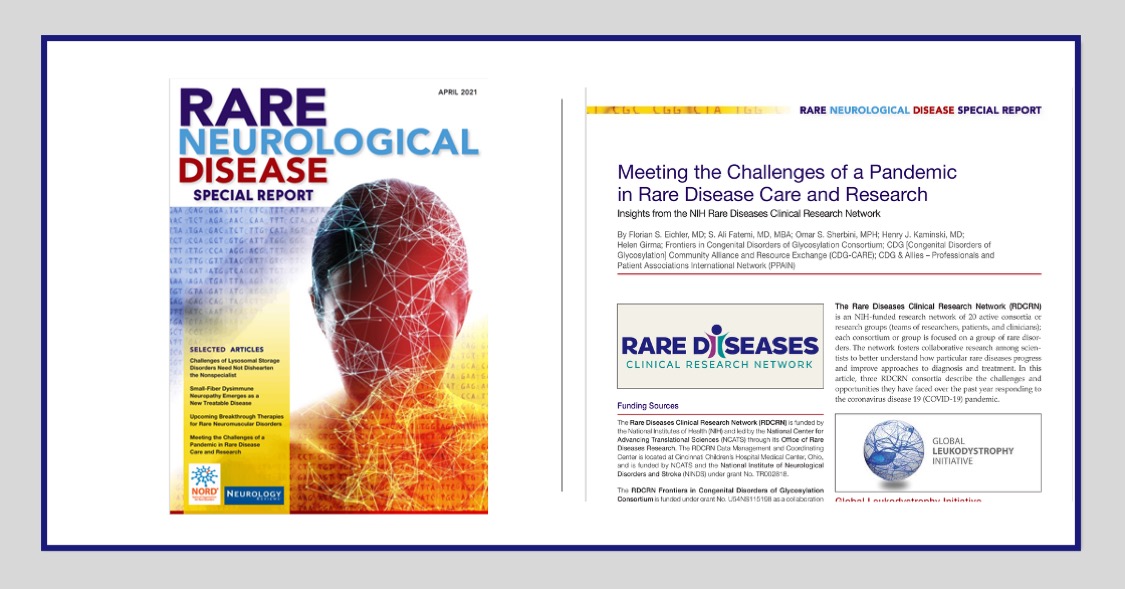Challenges in conducting clinical research in the midst of the COVID-19 pandemic are spotlighted in an article from three consortia of the Rare Diseases Clinical Research Network (RDCRN). Their contribution was featured in the latest issue of Rare Neurological Diseases Special Report.
Contributing consortia include:
- Global Leukodystrophy Initiative Clinical Trials Network (GLIA-CTN)
- Myasthenia Gravis Rare Disease Clinical Research Network (MGNet)
- Frontiers in Clinical Disorders of Glycosylation Consortium (FCDGC)
All three consortia are in their first funding cycle as part of the RDCRN network.
The GLIA-CTN team shares how they responded to the shifting research environment by embracing opportunities for tele-research. They undertook a small-scale pilot to test the use of remote patient assessments. Preliminary data confirmed that such approaches not only allow subjects and caregivers to engage with researchers in a more comfortable setting, but also promote inclusion of additional patients worldwide who may not have been able to travel to a study site.
The MGNet team, like most research teams during the pandemic, had to contend with closing research laboratories, halted studies, and an uncertain future. They adopted telemedicine visits and virtual visit follow-up through teleconferencing and videoconferencing and undertook a formal study to validate the reliability of myasthenia gravis-specific outcome measures in virtual visits. MGNet is also undertaking access and educational outreach efforts to engage a more diverse population in its investigations.
FCDGC likewise turned to telehealth visits through videoconferencing to continue its research through the pandemic and found advantages in reduced barriers for their patients who live in rural areas or in areas without a specialist nearby. However, they also found disadvantages: with telemedicine, researchers cannot examine patients as fully as is possible with in-person visits. They point to an urgent need for clinical training and skill-building around telehealth as well as the need for patient partnerships in digital service design, efforts to overcome the digital divide some patients face, and adapted digital offerings for patients with cognitive impairment.
Rare Neurological Diseases Special Report, published by Neurology Reviews and MDEdge, aims to educate the medical community on conditions they may rarely see and offer some hope to those who battle a rare neurological disease. Its seventh annual issue was published in April 2021. Read the article here.
The Rare Diseases Clinical Research Network (RDCRN) is funded by the National Institutes of Health (NIH) and led by the National Center for Advancing Translational Sciences (NCATS) through its Division of Rare Diseases Research Innovation (DRDRI), The Frontiers in Congenital Disorders of Glycosylation Consortium (FCDGC) is funded under grant number U54NS115198 as a collaboration between NCATS, the National Institute of Neurological Disorders and Stroke (NINDS), the Eunice Kennedy Shriver National Institute of Child Health and Human Development (NICHD), and the Office of Dietary Supplements (ODS). The Global Leukodystrophy Initiative Clinical Trials Network (GLIA-CTN) funded under grant number U54NS115052 as a collaboration between NCATS and the National Institute of Neurological Disorders and Stroke (NINDS). The Myasthenia Gravis Rare Disease Network (MGNet) is funded under grant number U54NS115054 as a collaboration between NCATS and the National Institute of Neurological Disorders and Stroke (NINDS).


